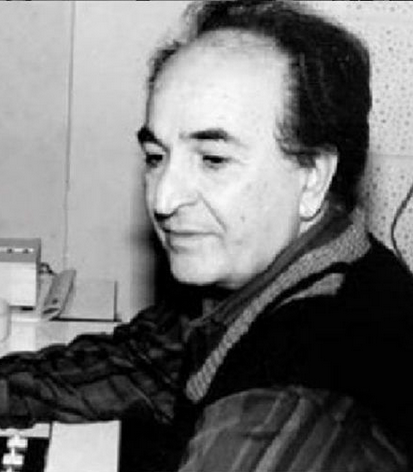|
|
|
|
| Mansuri, Rubik
 |
Date of Birth
1937, Tehran, Iran
Date of death
21 August 2000, Tehran, Iran
Rubik Mansuri (1937 - August 11, 2000)
Rubik Mansuri (1937, Tehran - 21 August 2000, Tehran) was an Iranian-Armenian film composer, music arranger, editor and sound designer. His fame was mostly related to the field of film music and sound.
Rubik (Ali) Mansuri studied at the Music Academy and his specialized instrument was the flute, but when he entered the cinema industry, despite the fact that his name was registered as a producer or selector of the soundtrack, he did not follow his specialized field.
In 1956, at the suggestion of Hassan Musaibi, and as his assistant, Mansuri went to Borna Studio (Cinema Ten) which was managed by an American named Stephen Nyman, and undertook the task of sound designing for the dubbing of Shaitan-e Farari (under the dubbing guidance of Zia Al-Absaari).
The first film with Mansuri's name in its title is Storm in Our Town. In this film, he was the assistant of Sorik Khachikian and Henrik Avdisian and responsible for the sound of the film, and in Ghased-e Behesht (1959), Khachikian's next film, he was promoted to the position of sound designer alongside Sorik and Hakop Giorgiz.
Since then, Rubik Mansuri's name has been recorded in hundreds of films as a sound designer, mixer, effect, synchronist, choice of soundtrack, etc., and his activity continued until the last moments of his life on August 21, 2000, at the age of 62.
After Azhirfilm, Mansuri expanded his career in Iran Film, Pars Film, Misaghieh Studio, Shahin Film and Filmkar studios, and worked as sound designer for films such as The Midnight Terror (Samuel Khachikian 1961), Mr. Twentieth Century (Siamak Yasami 1964) and The Mummy (Hamid Mojtahedi 1966). Yusof and Zuleikha (Mehdi Raeis-Firooz 1968) Blue World (Saber Rahbar 1969) Gheisar (Masoud Kimiai 1969) Hasan Kachal (Ali Hatami 1970) Escape from the Trap (Jalal Moghadam 1971) Goodbye Friend (Amir Naderi 1971) Sadegh Korde (Nasser Taghvai 1972) ) Postchi (Dariush Mehrjui 1972), Khak (Masoud Kimiai 1973), Haji Washington (Ali Hatami 1982), Boycot (Mohsen Makhmalbaf 1986), Gaal (Abolfazl Jalili 1989) and Narges (Rakhshan Bani Etemad 1992).
Rubik Mansuri's skill, creativity, good nature and long experience in cinema made many directors of his time and the later generation consider him as an expert and consultant and give him full authority when working with him.
Selected works of
Mansuri, Rubik
1982
Hajji Washington (1982)
1977
Hezar bar mordan | Dying a Thousand Times (1977)
1964
Aghaye gharne bistom (1964)
1958
Messenger of Heaven | Ghasede behesht (1958)
|
|
|
| Choose an item to go there!
|
|

